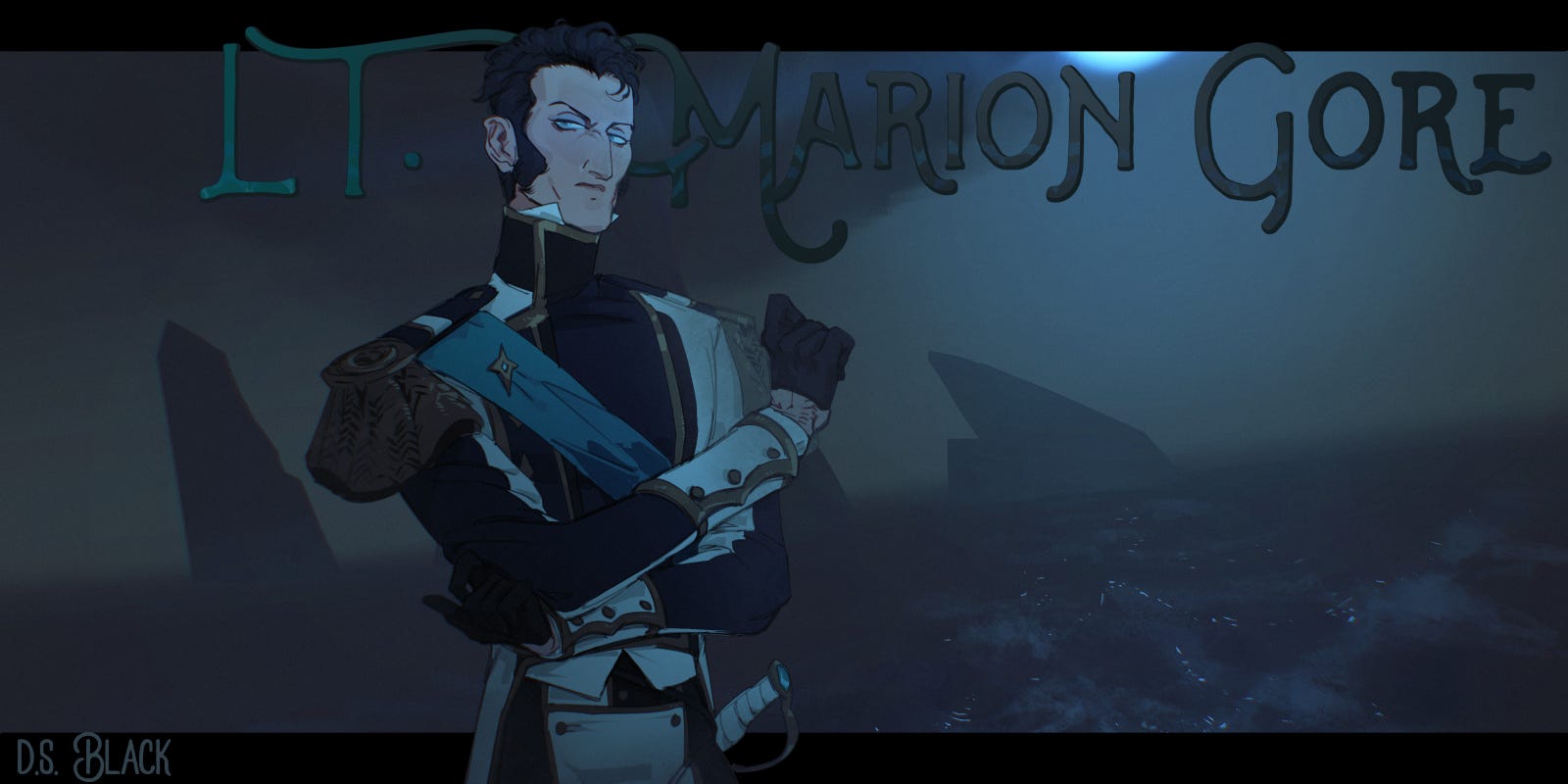Every great story needs its fulcrum—the character who makes a choice that changes the trajectory of everything that follows. In The Reply, that fulcrum is Lieutenant Marion Gore.
He is the aristocrat who chooses merit over bloodline. The analyst who recognizes competence as the only variable that matters. The cold, precise mind who looks at Captain Somerset—reckless, common-born, possibly cursed—and concludes: This man survived when he should have died. That is data I cannot ignore.
This is a dossier on the man who sat at his father’s table and burned every bridge to his old life—with surgical precision.
Dossier: Lieutenant Marion Gore
Designation: Second Lieutenant, Arunean Navy; Officer aboard the frigate Siren’s Reply
Known For: Analytical precision, aristocratic lineage, absolute competence
Appearance & Demeanor
Marion Gore is tall—even for a family known for their height—with the kind of bearing that suggests generations of selective breeding for command. His features are sharp and aristocratic: high cheekbones, a blade of a nose, pale blue eyes that assess rather than observe. Everything about him is crisp, controlled, economical. His uniform is always immaculate, every line pressed to geometric perfection, every button catching the light at exactly the right angle.
But here’s what sets Gore apart from every other aristocratic officer in the Arunean Navy: he doesn’t perform superiority. He simply is superior—at least in the variables he considers meaningful. Competence. Precision. Tactical analysis. He moves through chaos with the grace of a fencer, his saber an extension of cold, academic focus.
When he fights, it’s not a brawl. It’s a dissection. He doesn’t charge—he advances. His movements are a dancer’s waltz through violence. He’s not just fighting a problem; he’s solving it. And his blade is the proof.
His voice is steady, measured, carrying the absolute certainty of a man who has already run every calculation and knows the answer before you’ve finished asking the question.
Watch him work:
The creature at the bow moved with impossible speed, but Gore was faster—not in body, but in mind. He sidestepped with balletic precision, his saber tracing a path that was already decided three moves ago. The strike wasn’t aimed at thick hide or otherworldly flesh. It found the weak point, the joint, the fatal flaw in the thing’s architecture.
One thrust. Clean. Precise. Final.
The creature fell. Gore wiped his blade without ceremony and moved to assess the next problem. No triumph. No relief. Just the next variable in the equation.
This is Gore in his natural state: a blade of cold precision cutting through chaos with the absolute confidence of someone who knows exactly what he’s doing.
Psychological Profile: The Rebellion of Logic
Marion Gore was raised to be a certain kind of officer. The kind his father envisioned: methodical, traditional, obedient. An aristocrat who understood that bloodline was the foundation of authority, that connections mattered more than competence, that the “right” families produced the “right” officers through breeding and training alone.
His father, Commodore-General Valoren Gore, is a fortress of certainty. Tall, austere, absolutely convinced that his way—the old way, the proper way—is the only way. He occupies space the way fortresses occupy headlands: immovably, permanently, without question.
Marion was supposed to become that. A continuation of the family legacy. Another Gore in the long chain of Gores who commanded through birthright rather than earning it through blood and salt.
But Marion made a different calculation.
He looked at Captain Henry Somerset—common-born, reckless, contemptuous of regulations—and saw something his father couldn’t process: Somerset survived when doctrine said he should die. Somerset held a ship together through the Fathom’s Dream when every law of seamanship said it was impossible.
That is not luck. That is not charm. That is data.
And data, to Marion Gore, is the only god worth worshipping.
The Variable He Can’t Control
Gore burned his bridges. He chose Somerset over his father, competence over bloodline, the risky variable over the safe certainty. He made that choice with his eyes open, fully aware of the cost.
But here’s the question Gore himself can’t answer yet: How long does that equation hold?
Somerset survived the Fathom’s Dream. That data justified the choice. But Somerset is also becoming something Gore doesn’t fully understand—something touched by forces that don’t operate on logic. And Marion Gore is, above all else, a man who trusts data.
What happens when the data changes? When Somerset’s competence starts looking less like skill and more like communion with something that wants to claim him? When the sea’s obsession with his captain becomes undeniable?
Gore chose to stay. But he’s an analyst, not a zealot. He follows Somerset because Somerset has proven his worth. The moment that proof becomes compromised—the moment competence tips into madness—Gore will recalculate.
For now, he stands at Somerset’s side. Whether that’s loyalty or simply a long-term tactical assessment remains to be seen.
The real question isn’t whether Gore respects Somerset. It’s whether respect will be enough when the abyss starts calling louder.
Fair winds,
—D.S. Black




The fact that his rebellion comes not from some abstract need to rebell, not from some core ideological differences, but is the product of what he was meant to become is such a beautiful thing to me. Your child learned all you wanted to teach them and then... surpassed it, became even more perfect to a degree you can no longer accept.